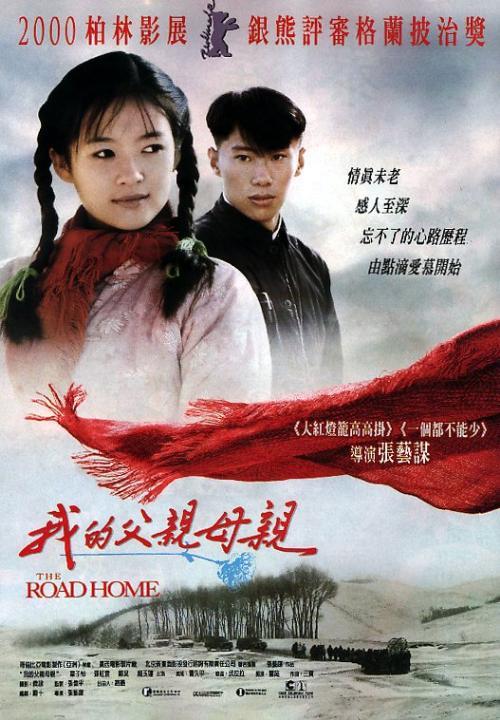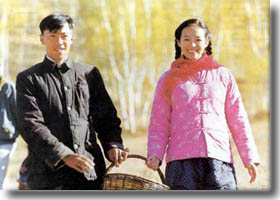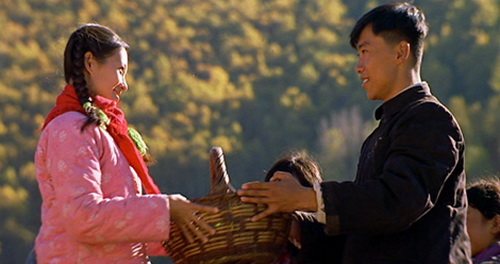

 字體:小 中 大
字體:小 中 大 |
|
|
|
| 2009/12/20 17:14:27瀏覽1022|回應1|推薦17 | |
 Director: Yimou Zhang, 1999. The Road Home is a beautiful Chinese love story that is slow and simple. With wonderful cinematography it shows the culture and lifestyles of rural Chinese peasants. The pace of life is poetically pedestrian, which is quite a contrast to the frenetic frenzy of urban life in modern-day America. This story of love and life begins with death. Luo Yesheng, a businessman, returns along the cold and snow-covered road to his home village in northern China. His father, the life-long solo village teacher, has died. When he gets there, he finds out from the village mayor that his mother wants to have traditional burial customs observed for the funeral. As he considers this strange request, Yesheng remembers the story of his parents' romance. In this flasback story, the village is finally getting a teacher. The one-room school-house is not even finished but the young and handsome Luo Changyu arrives to a hero's welcome. Yesheng's mother, Zhao Di, is just 18, illiterate but full of life. When she sees Changyu she is smitten by love. In that time, life was hard and characterized by chores and duties. Marriages were arranged by parents, not based on love. Di's discovery of her new passion changes her approach to life. As the men build the school by hand, she weaves a red blanket by hand. This blanket will adorn the rafters as a sign of good luck. Additionally, when the building is finished, she continues to go to the old well to draw her water, since it gives her opportunity to pass the place where her love Changyu works. His voice beckons her, and she is drawn to it like a moth to a flame. The developing romance between these two young people is shown with subtlety and restraint. Their customs would not permit physical contact. Their politeness and respect for the traditions of the village would not allow them to pursue their relationship without approval. And the politics of the time cause a separation. Yet, their love did not go unnoticed. Di waited on the road between the city and their village for him to return to her during their time apart. This love that defied the customs of the time led to the first marriage based on love rather than being arranged. The Road Home does not address the pros and cons of the tradition of arranged marriages. To understand that better, we must turn to another film, Arranged. In that one, two young women in modern-day New York are going through arranged marriages. The restrictions of such relationships is countered by the protective wisdom of the parents, who are simply trying to do the best for their children. Scorned as old -fashioned and opposed to self-autonomy, there is still something to be gleaned from the underlying purpose of this form of marriage.  But love is at the heart of the relationship between Di and Changyu. It is clear to all. Eventually they are free to marry and establish a life together in the small village. The boy from the city becomes committed to a woman, a village and a vocation. But love is at the heart of the relationship between Di and Changyu. It is clear to all. Eventually they are free to marry and establish a life together in the small village. The boy from the city becomes committed to a woman, a village and a vocation.To tell this love story Zhang uses vibrant color for the images from yesteryear. In contrast to the beauty of the colorful countryside, the gritty realism of death and its consequent duties are shown in grainy black and white. Like The Wizard of Oz, Present day reality is shown in monochrome. In another point of similarity, Oz's theme is "there's no place like home" and Dorothy follows the yellow brick road to find her way home. Both have roads home that are central to the storyline. The elderly and frail Di wants her husband's body to be carried from the hospital morgue back to the village by foot. The tradition said that in doing so, and in periodically "telling" the dead person what was going on, the body will never forget the road home. Of course such tradition is simply superstition. Yusheng knows this. He is, after all, from the big city where superstitions no longer survive. But he is also a respectful son who understands the need to honor his mother. Honoring our parents is a clear biblical mandate. In fact, it is the only one of the Ten Commandments that carries with it a promise: "Honor your father and mother, so that you may live long in the land the LORD your God is giving you "(Exod. 20:12). Sometimes such honoring means doing things we disagree with. It may mean going the extra mile, or miles, when others would think it foolish. But our parents have spent years of their lives raising us, caring for us, and finally freeing us to live our lives. We can and should respect their wishes as long as we are not asked to do things that are immoral. In this case, Yusheng realizes this tradition is important to his mother and he complies. As Craig Detweiler says elsewhere, "When the future is uncertain, nothing comforts quite like the past. History [tradition] offers a sense of certainty." Death brings us face-to-face with uncertainty. Perhaps because she did not maintain the tradition of arranged marriage, Di felt the need to maintain other traditions that were important to her and the older villagers. The younger people in the village thought it rash and expensive and unnecessary. But the road had played a central part in their romance and it was appropriate that this tradition be honored. The Road Home reminds us of the importance of tradition. Paradoxically, I honor some traditions and reject others. I find myself looking back with fondness to some I grew up with, like Christmas crackers and chocolate Easter bunnies. Some I have transported over the ocean to my new country. Wearing paper hats at the Christmas dinner table may seem silly to some but it is a deep tradition that covers half a century. Yet, I find myself scoffing at the traditions of others that I barely understand. I tend to pooh-pooh the traditions of dress-codes and titles, of tastes in music and style. Perhaps when I start thinking of criticizing someone else's tradition, I need to remember Yusheng, who, with grace and at great personal cost, undertook a tradition that meant nothing to him, only to his mother. Perhaps I should also remember Yeshua, Jesus, who with grace and at great personal cost fulfilled the traditions and prophecies of his predecessors, which meant everything to his Father ... and to us. Read more: http://mosaicmovieconnectgroup.blogspot.com/2009/04/road-home-wo-de-fu-qin-mu-qin-honoring.html # ixzz0aDY07V3Y
|
|
| ( 知識學習|檔案分享 ) |












